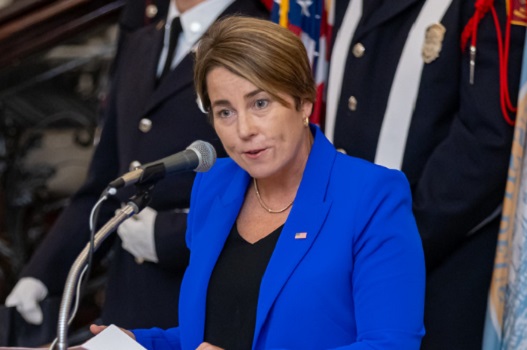Health
Massachusetts launches emergency system as state braces for health care disruptions amid Steward financial turmoil

Alison Kuznitz
BOSTON…..State officials have launched an incident command system as they brace for health care service disruptions in eastern Massachusetts, escalating patient safety and access efforts amid the financial turmoil at Steward Health Care.
The system, announced Friday morning and activated through an emergency operations plan, will enable better coordination across state agencies, hospitals, community health centers, community service organizations, and labor groups, the Executive Office of Health and Human Services said. Officials say the structure is meant to safeguard care and services at Steward hospitals, as well as respond to any “transitions in care” that could create cascading effects for regional health care access.
The command system “incorporates the ongoing external monitoring in all Steward hospitals,” which began in January, DPH Commissioner Robbie Goldstein said, and “enables DPH to rapidly respond to any clinical needs or issues that arise, and fosters increased communication with other regional health care organizations, first responders and community leaders.”
The system was activated on Wednesday, an EOHHS spokesperson told the News Service.
DPH monitors in Steward hospitals continue to assess whether facilities “have the necessary supplies, equipment, and staffing to deliver safe and effective care.” State officials stressed that Steward’s hospitals in Massachusetts remain open and providing care.
The incident command system will be helmed by Dr. Gregg Meyer, senior vice president for quality and safety at Massachusetts General Hospital and Massachusetts General Physicians Organization. Meyer has “extensive experience in hospital operations and crisis management,” officials said.
“This week, the Massachusetts Department of Public Health activated its Emergency Operation Plan as part of our ongoing commitment to ensure patient safety, protect access to care and preserve jobs,” Health and Human Services Secretary Kate Walsh said in a statement. “This next step is part of our continued response to Steward Health Care’s financial challenges.”
During an GBH “Ask The Governor” segment on the UMass Boston campus on Friday afternoon, Gov. Maura Healey said that Steward will be exiting Massachusetts, which she described as a “very good thing based on their completely unscrupulous behavior.” She’s repeatedly accused Steward CEO Ralph de la Torre of financial mismanagement and shielding financial documents from state regulators.
“So great, get them out of town, but in the meantime, it’s like, how do you manage that orderly transition? Who’s going to come in and take over? What is that going to look like?” Healey said. “And it’s something that we are committed to making sure that we manage as thoughtfully as possible, and that we work with our network of existing other hospital providers and other physician networks to make sure, again, that patients are covered, that workers are protected, and that the stability of the market is in place.”
State officials last month began holding private meetings with local health care leaders to help navigate the uncertainty around the Steward crisis, a step that Walsh said should be “very reassuring” to those concerned about preparation for disruption
Walsh said the planning would focus on patients and staff, told reporters on April 16. “Remember, lots of staff are working in hospitals that they know are financially troubled. We want to support them on that journey,” she said.
During a Senate oversight hearing last week, Walsh said officials were preparing for Steward to potentially file for bankruptcy and acknowledged there had been some discussion surrounding receivership. While Walsh said officials were prepared to respond to the Steward crisis, she also described the murky future engulfing the for-profit hospital system.
“We still don’t know exactly what’s going to happen or when it’s going to happen,” Walsh told the Senate Post Audit and Oversight Committee. “But we have a prepared, thoughtful, coordinated response. People from all aspects of the health care industry — long-term care, behavioral health — have been in the room with us as we’ve been sorting this out. We also know that the issues in Taunton are different than the issues in Methuen, and we’re trying to craft our response to be tailored to the region.
Health care workers say they also have little clarity about Steward’s future, even as the company faced a deadline this week in connection with its plan to shore up its finances. Health care providers and community members rallied outside Steward’s St. Elizabeth’s Hospital in Brighton on Monday in their bid to keep the facility open.
“Our members are really concerned that the hospitals will close,” Cari Medina, vice president for Local 1199 of the Service Employees International Union, had told the News Service. “They’re super concerned about Steward declaring bankruptcy, they want to know what happens to their jobs. But more importantly, they care about each other and their community, because this will affect patients too.”
Steward operates eight hospitals in Massachusetts: St. Elizabeth’s in Brighton, Carney Hospital in Dorchester, Good Samaritan Medical Center in Brockton, Holy Family Hospital in Methuen and Haverhill Hospital in Haverhill, Morton Hospital in Taunton, Nashoba Valley Medical Center in Ayer, Norwood Hospital, and St. Anne’s in Fall River.
-

 Community7 years ago
Community7 years agoNational Shrine of La Salette Festival of Lights 2017 set to begin
-

 Community6 years ago
Community6 years agoMassachusetts State Police looking for good home for retired dogs
-

 Crime6 years ago
Crime6 years agoFall River ranked most dangerous city in Massachusetts according to report
-

 latest7 years ago
latest7 years agoDurfee student allegedly overdoses on marijuana
-

 Community6 years ago
Community6 years agoVideo of Fall River Police goes viral
-

 Causes6 years ago
Causes6 years agoMissing Fall River woman found deceased
-

 Crime6 years ago
Crime6 years agoFall River Police add names to most wanted list
-

 Causes6 years ago
Causes6 years agoFall River teenager reported missing has been found




